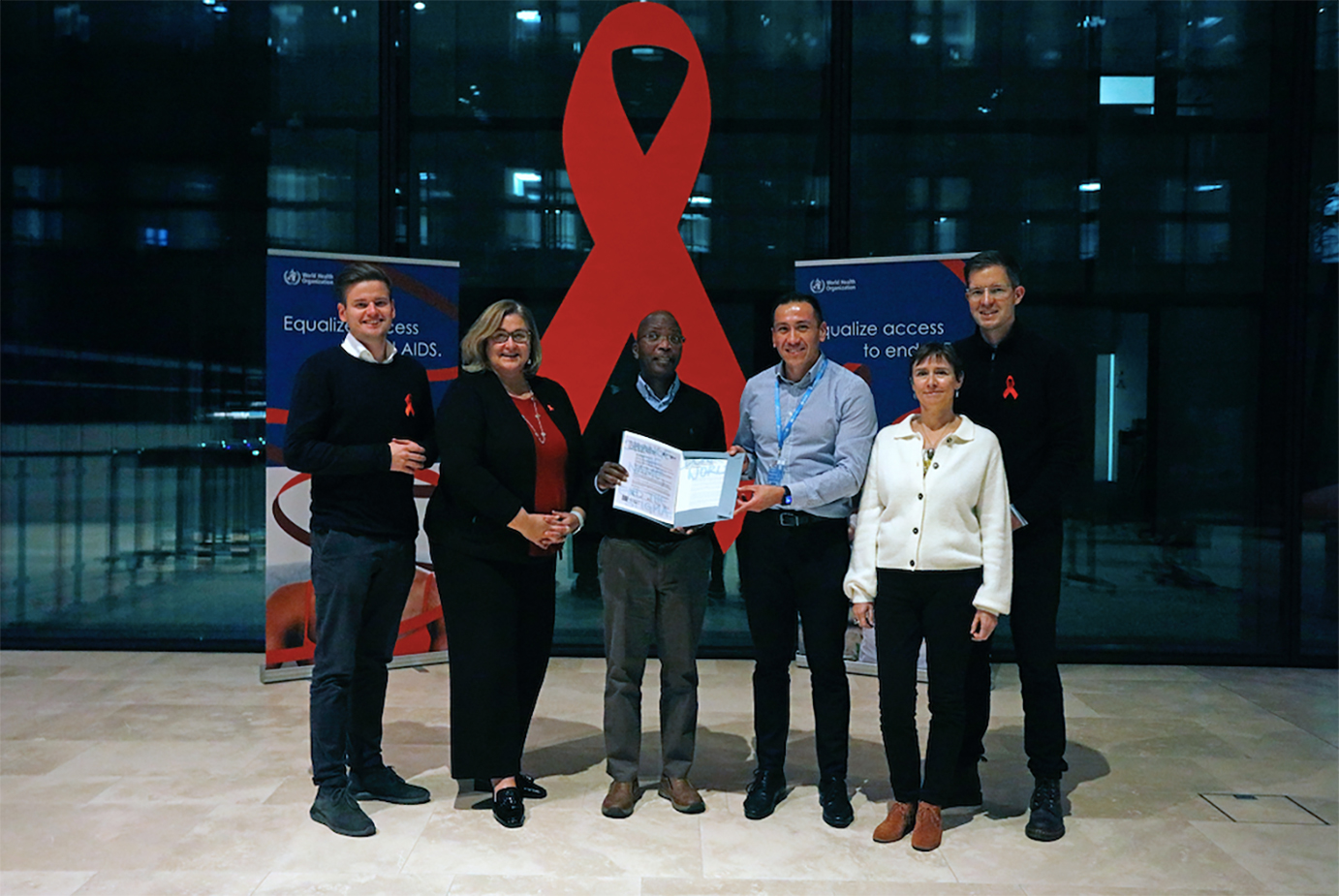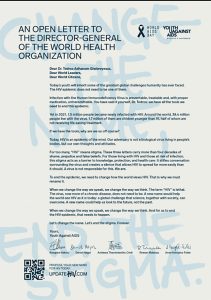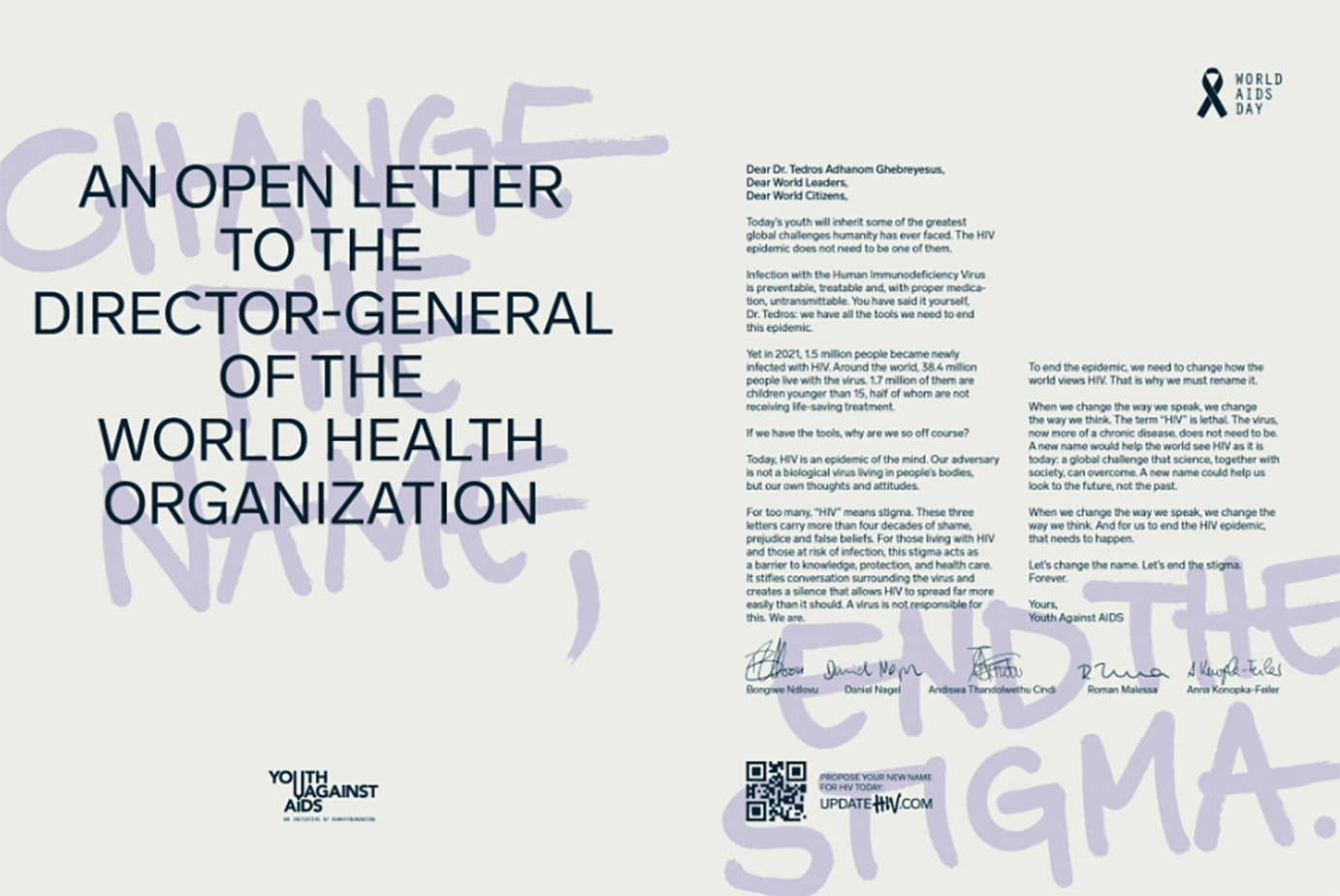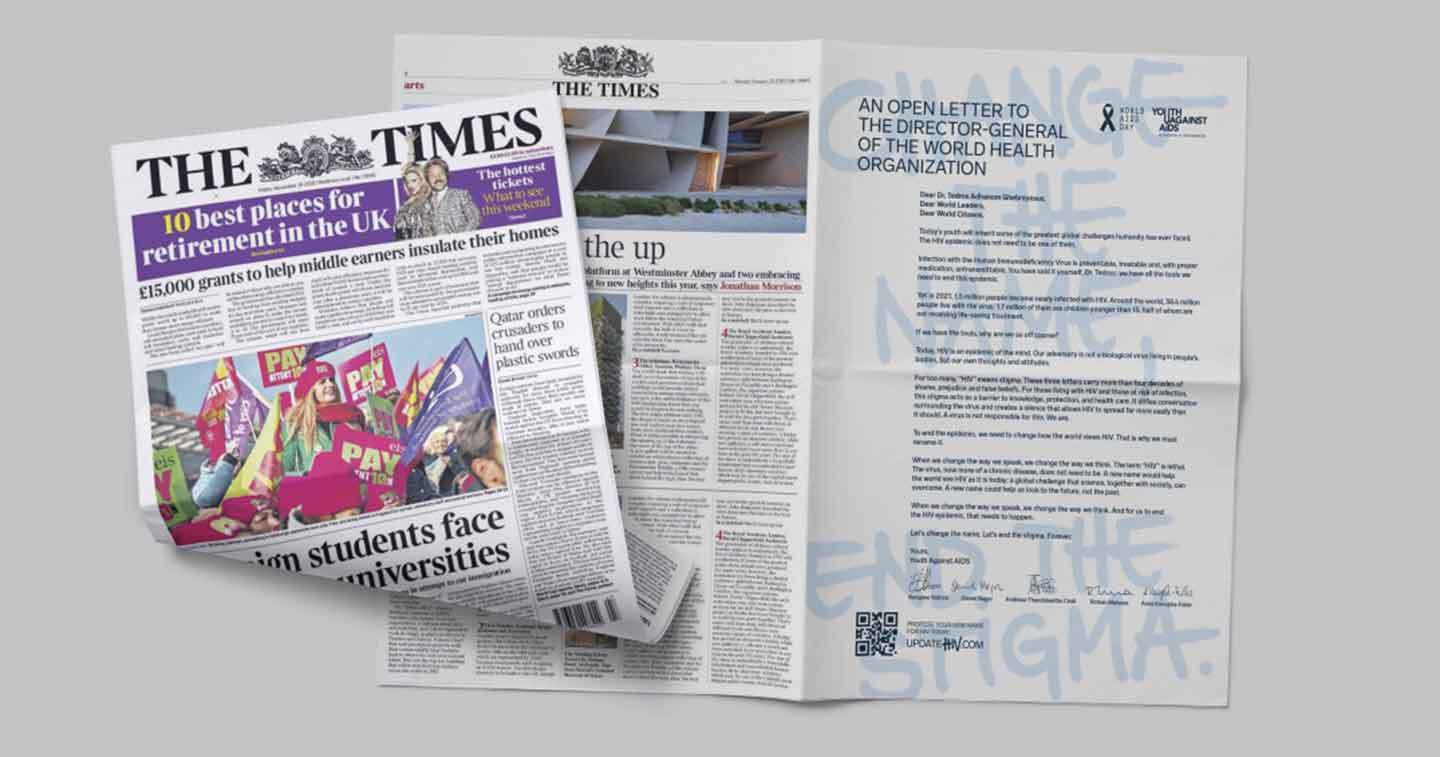BERLIN, GERMANY — “Change the name, end the stigma” is the core message of the global campaign of non-government organization Initiative Youth Against AIDS with creative agency Serviceplan Switzerland. On the occasion of World AIDS Day, an open letter to the Director-General of the World Health Organization, Dr. Tedros Adhanom Ghebreyesus, was published, calling on him to officially rename HIV.
The letter describes HIV as an “Epidemic of the Mind,” and it is caused and perpetuated primarily by non-medical factors. The report that supports this, prepared by Youth Against AIDS in collaboration with LMU Munich and supported by the Boston Consulting Group, explored the question of why so many young people are still becoming infected with HIV. It found that it is not medical-therapeutic obstacles, but those of an intellectual nature, that prevent the epidemic from being fought. HIV is an “Epidemic of the Mind.”
In all cultures, the justified fear of being considered promiscuous, impure, or dangerously infectious still leads vulnerable groups and people living with HIV to not take advantage of treatment and prevention measures. The Update HIV campaign aims to spark a new and progressive discussion about the issue on a personal and political level, in order to permanently change the way HIV is viewed and put an end to new infections. All of this starts with something very fundamental: the name.
Thanks to years of research, infection with HIV is now preventable, treatable, and, with successful therapy, non-transmissible. Despite these medical advances and significant reductions in infection and mortality rates, millions of people still contract HIV.
In 2021, 1.5 million people worldwide were newly infected with the virus. Globally, 38.4 million people are living with HIV, 1.7 million of whom are children under the age of 15, half of whom lack access to vital treatment.
Today, however, the biggest obstacles to ending the HIV epidemic are no longer medical, but social, cultural, and political: Living with HIV today is nothing like it was 40 years ago. Stigma, however, has remained nearly the same.
 “Calling on the world’s largest international health organization to give the virus a new name is intended to promote recognition of the advances in treatment and understanding of HIV, giving people who live with the virus the chance to live the stigma-free life they deserve,” said Daniel Nagel, executive director of the ohhh! foundation. Youth Against AIDS is a youth-led initiative of the ohhh! foundation.
“Calling on the world’s largest international health organization to give the virus a new name is intended to promote recognition of the advances in treatment and understanding of HIV, giving people who live with the virus the chance to live the stigma-free life they deserve,” said Daniel Nagel, executive director of the ohhh! foundation. Youth Against AIDS is a youth-led initiative of the ohhh! foundation.
Daniel explained, “Most people associate the term “HIV” with ideas that are outdated; they no longer reflect the reality of the virus in the 21st century. We need to break that stigma because it’s dangerously self-fulfilling. Asking people to use a new name for something makes them change their way of thinking. That’s what needs to happen.”
The campaign has already gained prominent supporters. According to Roman Malessa, ohhh! foundation, “Over the past few months, we have had the opportunity to share the campaign with people living with HIV, activists, and researchers, as well as in forums such as the Bill and Melinda Gates Foundation’s Goalkeepers event. The responses we have received have shown the need to change and more efforts. We can meet the UN development goal of ending the epidemic by 2030, but first we must end the stigma.”
The campaign has been in planning and preparation for 12 months. In September 2022, Youth Against AIDS representatives met at the United Nations General Assembly in New York to put HIV back on the agenda. On the other side of the city, the NGO and Serviceplan Switzerland made “Update HIV” visible with a billboard in Times Square.
Marcin Baba, creative director Serviceplan Suisse, commented, “How people talk about HIV and how campaigns communicate the topic both verbally and visually, has shaped our understanding of this disease for decades. Today, the three letters HIV are inextricably linked with stigmatization – with fears, hatred and alienation. These socio-cultural issues prevent us from ending the epidemic. Our creative approach uses classic marketing tools. In a rebranding process, we want to finally rid HIV of the harmful stigma.”
Jason Romeyko, worldwide executive creative director, Serviceplan Group said “I am terribly proud of the role creativity plays in this historical initiative. Not only will this move save lives, but ending the HIV stigma will contribute to better mental health and prosperity for millions of people around the world. It is my hope that the Update HIV will inspire other diseases hampered by stigma to follow a similar approach.”
Raul Serrat, executive creative director Serviceplan Suisse, added, “What hinders HIV testing and treatment programs is basically an image problem: too many people see HIV as a stigma, get too little education and no appropriate treatment. With the Update HIV campaign, we want to initiate a discussion to change just that and continue the successful fight against the virus.”
The goal is to engage the public and lead the discussion about stigma, the importance of language and working to come up with better solutions. For example, anyone can go to www.updatehiv.com to sign the open letter, submit a name suggestion for renaming the HIV virus, and join the discussion. As the campaign continues, a participatory process will ensure that we involve as many people as possible in this open discussion. The website contains additional information about HIV and the ongoing impact of stigma on the epidemic. More campaigns are planned in the coming months.
The publication of the Open Letter in esteemed print publications such as The Times (UK,) Tagesspiegel and Handelsblatt (Germany), and NZZ (Switzerland), as well as digitally and OOH was accompanied by extensive press coverage and a social media campaign, with influencers sharing the campaign message and ask people to get latest information about HIV on the website.
The campaign film, which can also be seen on the website, is in collaboration with renowned photographer Gideon Mendel, who has been photographically documenting the HIV/AIDS epidemic in South Africa since 1980.
Learn more about the Epidemic of the Mind report here. 
CREDITS:
Serviceplan Group:
Jason Romeyko: Worldwide Executive Creative Director
International Communications Officer: Lee Sharrock
Head of Corporate Communications, Serviceplan Agencies: Birgit Koch
Ohhh! Foundation:
Daniel Nagel, CEO
Roman Malessa, Management Team Member (Partnerships & Africa Head), Project Lead
Jona Koch PR Lead (JK Access GmbH)
House of Communication Switzerland
Pam Hügli: CEO
Raul Serrat: CCO
Marcin Baba: Executive Creative Director
Micha Seger: Executive Creative Director
Henry Clarke: Senior Copywriter
Günter Zumbach: Senior Copywriter
Joss Arnott: Junior Copywriter
Nadja Tandler: Art Director
Carina Kienzle: Junior Art Director
Dominik Shota Schweingruber: Motion Designer
Dario Pucci: Motion Designer
Lea Manfredi: Motion Designer
Lorenzo Müller: Senior Digital Art Director
Luca Di Francesco: Digital Art Director
Aline Litchenhaus: Senior Account Manager
Laura Seifert: Account Manager
Peter Schäfer: Chief Strategy Officer
Philip Zsifkovits: Senior Strategist
Alain Stocker: Strategie
House of Communication Spain
Ainhoa de las Pozas: General Management
Emilio Valverde: Executive Creative Director
Pablo Tesio: Senior Copywriter
Carlos Alcácer: Senior Art Director
David Pérez: Art Director
Vanesa Gómez: Account Director
Marta Queiruga: Public Relations House of Communication Paris
Mickaël Paillard: Lead Developer
Matthieu Decarpenterie: Lead Developer
Jonathan Conan: Account manager junior
Charlie D’halluin: Web Developer
Anthony Laplane: Word Press Developer
Adrian Albu: Devops Engineer
House of Communication Hamburg
Dennis Fritz: Creative Director Video










